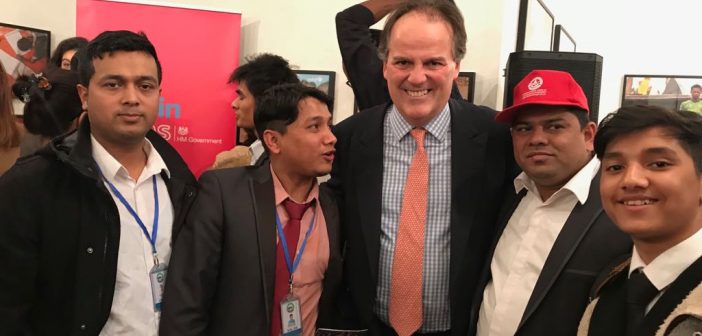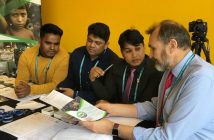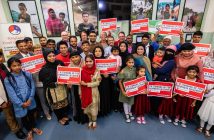The British Rohingya Community met last week with the UK’s National Education Union and the British Government’s Minister of State for the Foreign and Commonwealth Office to discuss schooling for refugees in Bangladesh, international Rohingya resettlement programmes and about referring those responsible for the ongoing genocide in Rakhine State to the International Criminal Court.
A delegation from the British Rohingya Community (BRC) traveled from Bradford to London on Thursday, 22nd March for two meetings to try to help the estimated 900,000 Rohingya refugees now living in Bangladesh gain improved daily living conditions and better options for their futures.
The first meeting, with Samidha Garg, International Officer at the UK’s National Education Union (NEU), discussed the educational situation for the hundreds of thousands of Rohingya children living in the Cox’s Bazar area of Bangladesh.
At least 688,000 refugees have fled from Myanmar’s Rakhine State since August 25th, 2017, following an extreme escalation of violence that the UN’s Special Rapporteur on Myanmar, Yeehang Lee, described as bearing “the hallmarks of genocide”.
These people now live in basic plastic tents in overcrowded camps in Cox’s Bazaar where they have joined another 200,000 refugees who have been living there since a previous outbreak of violence in the early 1990s. Global children’s charity, Save the Children, estimate more than half of this population is now made up of children.
The British Rohingya Community met with the NEU to discuss specific steps that could be taken to help these children get access to formal schooling and the NEU agreed to write to both the Bangladeshi Government’s Ministry of Education and the UK Government’s Foreign Office and ask that Rohingya students be allowed to attend local Bangladeshi schools.
“Being a refugee is not a crime,” said BRC General Secretary, Nijam Mohammed. “These children are caught up in a political game that is no fault of their own. Education is the backbone of any community and the schools in the camps are makeshift and informal and these children have a basic human right to be offered more.”
The BRC also thanked the National Education Union for its donation of £5,000 made to help the Community with its mission of raising awareness of the Rohingya crisis. The Union has also given Nijam Mohammed an opportunity to address the delegates attending the annual NEU conference in Brighton next week.
In addition, the NEU will contact all its division offices to raise awareness about the Rohingya crisis.
The British Rohingya Community’s second meeting was with the Rt. Hon. Mark Field, MP, the UK Government’s Minister of State for the Foreign and Commonwealth Office.
Here the BRC urged the British Government to refer those, from the Myanmar Army or from elsewhere, who are responsible for the murder and violence in Rakhine State, to the International Criminal Court in The Hague in the Netherlands.
The parties also discussed the resettlement options for the more than one million Rohingya now living in Bagladesh, India, Indonesia and Malaysia and Mark Field told BRC that even though not much has been said by the British Government on these matters publicly there was “some very important work going on in the background.”
The BRC in return highlighted the need for a political solution and emphasised that its aims and actions will always be centered around non-violent action.
The British Rohingya Community has more meetings planned in the coming days and weeks, with governments’ officials and lobby organisations from the UK and the international community, and will use these meetings to continue to press for justice and rights for the Rohingya people.




